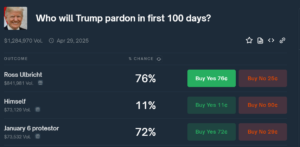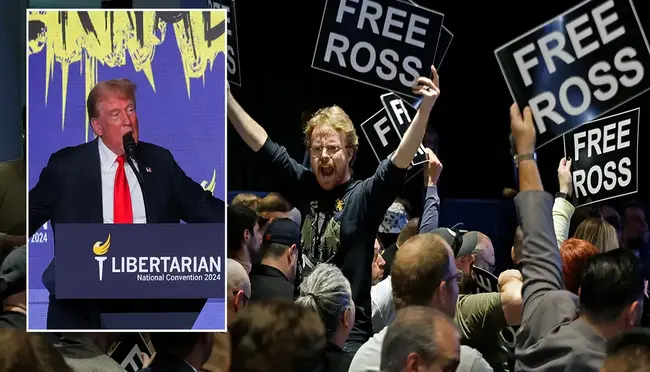Highlights:
- Trump’s day one pledge on Ulbricht’s commutation could test his commitment to civil liberties reform.
- Ulbricht’s severe sentence sparks debate on digital rights, with many calling for a fair reassessment.
- Polymarket odds give a 77% chance Trump will commute Ulbricht’s sentence within his first 100 days.
Ross Ulbricht, the founder of the Silk Road, recently posted on X expressing hope for clemency following Donald Trump’s re-election. Ulbricht wrote that he now sees the light of freedom after Trump’s election victory. The post was made just days after Trump secured the presidency, and it has ignited discussions about a potential sentence commutation.
🚨 Ross Ulbricht, Silk Road founder, awaits a Trump pardon after 10+ years in prison. His case stirs debate on cyber law, digital rights, and justice reform. #RossUlbricht #Trumphttps://t.co/8FG4zJXrcX
— TWJ News (@TronWeekly) November 14, 2024
Ulbricht received his sentence in 2015 and is now facing life imprisonment. The federal court found him guilty of money laundering, computer hacking, and drug trafficking conspiracies. Since then, there has been a Free Ross campaign that seeks to release him.
Some people in the cryptocurrency community argue that the severity of Ulbricht’s punishment is unfair. They argue that his case indicates a worrying trend of tough sentences in the digital age.
Trump’s Promise to Ulbricht Echoes Libertarian Support
During the campaign, Trump promised to release Ross on the first day if he is re-elected. He made this comment while speaking to the Libertarian National Convention in May. His statement was welcomed by many libertarians who view the case of Ulbricht as a clear sign of a violation of liberties by the state.
His commitment also caught the attention of cryptocurrency advocates. Some view the Silk Road as Bitcoin’s early proof of concept. Ulbricht’s case, in their view, is symbolic of digital freedom and privacy rights. Trump’s supporters argue that fulfilling this pledge would demonstrate his commitment to civil liberties.
However, some remain skeptical. Election pledges quite frequently fail to materialize after elections. PolitiFact has rated that Trump fulfilled or partly fulfilled 23% of his campaign promises during his first term. However, the power to pardon or reduce a sentence still rests with the president. Many believe that following through on Ulbricht’s case would strengthen his credibility.
Reminder that Trump only kept 23% of his promises last time.
Way to pick 'em, MAGA. 👍 pic.twitter.com/XL0FWQUWPo
— Tom Santos (@tommysantos14) November 12, 2024
The Silk Road Case
Ulbricht launched Silk Road in 2011, aiming to create a free-market platform. He banned violent services and stolen goods, intending the site to operate with a code of ethics. However, authorities discovered that among the items listed and sold on the site were banned substances such as illegal drugs. By 2013, the federal agents had taken down the platform and arrested Ulbricht. They accused him of seven non-violent felonies.
These charges included conspiracy to commit money laundering, computer hacking, and dealing in drugs. Although the jury did not find the defendant responsible for any violent crimes, Ulbricht was given a life sentence without the possibility of parole.
Will Trump Follow Through on His Pledge?
The release of Ulbricht will become an early benchmark of his promises. Presidential power to commute a sentence does not need the approval of Congress. Most people view it as a litmus test of his stand on issues concerning civil rights and government intervention. Polymarket predictions give a 76% chance that Trump will commute Ulbricht’s sentence within his first 100 days in office.

Supporters of Ulbricht identify some elements that make his case a social issue rather than specifically being about crypto. For them, Trump’s actions could shape public opinion on various matters including digital rights and justice reforms. Furthermore, meeting the promise might affect Trump’s standing with libertarian supporters. Inaction may be interpreted as a lack of capacity to implement other campaign promises.





